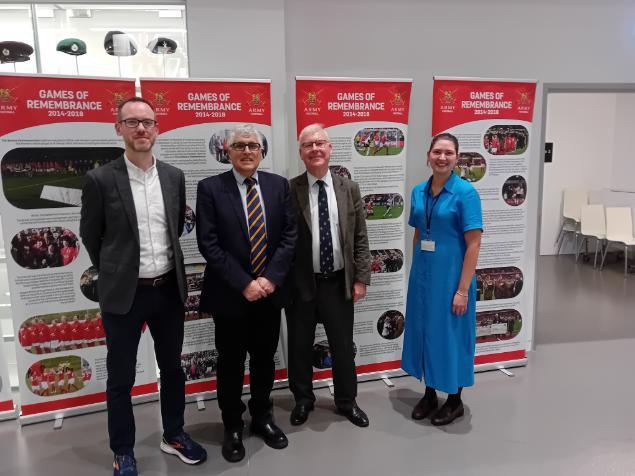Sharing History: The Army Football Association Archive
18/11/2024 - 4.28
Alex Alexandrou
As part of its History Heritage Project, the Army FA in partnership with the National Army Museum, Western Front Association and the Football and War Network has organised a series of public events that have covered various aspects of Army football, contextualizing them from a contemporary perspective.
On the 16th October, the third of these events took place at the National Army Museum entitled – Football and War: The Army FA Archive. This event was the culmination of National Army Museum’s Football and War series.
The panel of experts assembled for the event were:
Hannah Tame, the Museum Archivist at the National Army Museum who has been cataloguing the Army FA collection since it was donated at the end of 2023. Hannah has worked with archive collections at organisations such as the British Library, the Church of England and the National Maritime Museum. She has a special interest in oral history collections and highlighting women’s stories from the archive.
Alex Alexandrou, the co-founder and chair of the Football and War Network. He is currently the project manager for the Army FA History Heritage Project.
Gary Sheffield, one of Britain’s leading military historians. He is president of the Western Front Association and has published widely on British military history with a focus on the First and Second World Wars.
The panel was hosted by Glyn Prysor, who is an Assistant Director for Research and Programmes at the National Army Museum and is the author of Citizen Sailors: The Royal Navy in the Second World War.

The Panel Left to Right - Glyn Prysor, Alex Alexandrou, Gary Sheffield and Hannah Tame. Source: Author's Collection
The panel of experts discussed the Army FA Archive in terms of demonstrating how football has become an integral part of life in the Army and during times of conflict within wider society.
A number of key themes and matters of contention emerged from the discussion and the question and answer session that followed. These included firstly, how the introduction of competitive football had a significant impact in relation to fitness, leadership and team working for both officers and soldiers.
Secondly, how important playing Army and Unit representational football was for the morale of troops in both the Great War and Second World War, on the Home Front and abroad. This included the East Surreys and the London Irish Rifles kicking footballs whilst charging at the enemy in World War One and the psychological impact of such actions, playing in organised cup competitions and in the Second World War, being part of touring teams led by notable players and future managers such as Matt Busby and Denis Compton, in Italy and India respectively.
Thirdly, the panel discussed the myth and reality of Christmas Truce football being played during 1914. With the view being, that whilst there is evidence of football being played it was not in the manner portrayed in popular culture such as in commercials, certain images used such as the one of soldiers playing football in Salonika and where the UEFA memorial has been situated.
Fourthly, the amount of football played during the National Service era, post-World War Two, with two key points to emerge, that footballers were not exempt and that mere mortals would be playing alongside football gods such as Duncan Edwards, who tragically lost his life following the Munich Air Disaster of 1958.
Hannah spoke about the importance of the Army FA Archive from two perspectives, firstly how she has enjoyed reading and researching the development of Women’s football in the Army, since its inception in the 1990s. Secondly, how the collection supports the Museum’s pre-existing collections in the archive relating to Army Football.
The panel also explored some of the fascinating items that make up this extraordinary collection as well as the hidden stories coming to light of service and footballing achievement, based around such documents as the minute books and yearbooks, all of which in the near future will be waiting to be discovered, when the Archive is made open to the public at the National Army Museum’s Templer Study Centre - the new permanent home of the Army FA Archive.
.png)
A Montage From The Event. Source: Army Football Association
A number of these items were on display, as this event in line with the previous two, was further enhanced with an exhibition of artefacts from both the Museum and Army FA collections, along with a set of banners, telling the story of the Army FA.
Biography
Alex Alexandrou is the Co-Founder and Chair of the Football and War Network.


/prod01/wlvacuk/media/departments/digital-content-and-communications/submitted-news-images/Smelting-knife.png)
/prod01/wlvacuk/media/departments/digital-content-and-communications/images-2024/250630-SciFest-1-group-photo-resized-800x450.png)
/prod01/wlvacuk/media/departments/digital-content-and-communications/submitted-news-images/Way-youth-zone-August.JPG)
/prod01/wlvacuk/media/departments/digital-content-and-communications/images-2024/Arthi-Arunasalam-teaser.jpg)
/prod01/wlvacuk/media/departments/digital-content-and-communications/submitted-news-images/Muslim-woman-playing-football.jpg)
/prod01/wlvacuk/media/departments/digital-content-and-communications/submitted-news-images/Business-School-800x450.jpg)
/prod01/wlvacuk/media/departments/digital-content-and-communications/submitted-news-images/University-of-the-Year.jpg)